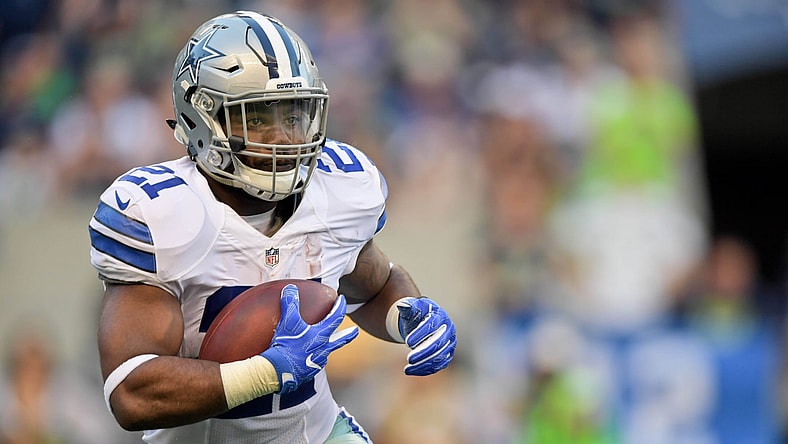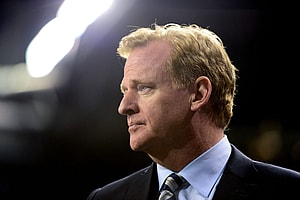
The appeal of the six-game suspension handed down to Dallas Cowboys running back Ezekiel Elliott is being heard this week. It’s most definitely a contentious environment in New York City as Elliott and the NFLPA meet with “independent arbitrator” Harold Henderson, who was hand-selected by the NFL to oversee the appeal.
With the odds already stacked against him after Henderson ruled testimony from Elliott’s accuser won’t be heard, the running back and his union are now preparing for the nuclear option.
This includes calling on the venerable Jeffrey Kessler to represent Elliott through the legal process.
If Kessler’s name rings a bell, that’s because it should. He’s been seen as a thorn in the side of the NFL for the better part of the of the past 25 years. It started when he helped Freeman McNeil and Reggie White in cases they brought to the court challenging the league’s free agency rules back in the early 1990s. These two cases led to free agency as we see it today.
Kessler also represented Tom Brady in his case against the NFL stemming from the four-game suspension the league handed down to the Patriots quarterback due to his alleged role in Deflategate. While Brady would ultimately drop his appeal before it went to the United States Supreme Court, the five-time Super Bowl winner definitely set precedent for the Elliott case in court.
In what was Kessler’s first step in representing Elliott, the lawyer requested an independent arbiter in the case. It was a procedural step in case Elliott’s suspension is upheld by Harold Henderson. The argument here is that Henderson is not an independent arbitrator, leading to the belief that the appeals process itself is nothing less than a kangaroo court.
It’s a theme that the NFLPA has continued hammering out to the public since Elliott’s suspension was upheld.
“They don’t know what they’re doing. And that’s what I think everyone is upset about. … I think it speaks to competitive balance. … this thing has gone on for a long time,” NFLPA president Eric Winston said earlier in August, via ESPN. “This thing should’ve probably been resolved a long time ago. It’s all part of it.”
It’s something the NFL hasn’t really helped itself with during the aftermath of the Elliott suspension announcement.
“Over the past few days we’ve received multiple reports of the NFLPA spreading derogatory information to the media about the victim in Ezekiel Elliott discipline case,” the NFL said in a statement in mid-August. “It’s a common tactic to attempt to prove the innocence of the accused by discrediting the victim — in this case Ms. Thompson — when coming forward to report such abuse.”
Notice how the NFL left out “alleged” when referring to the woman claiming that Elliott abused her? Elliott was never charged in the case, which makes any stance other than claiming him to be an alleged abuser libelous in the court of law.
We can rest assure that Kessler, Elliott and the NFLPA know this full well. It will be part of what promises to be a nuclear option set forth by the Elliott camp against the NFL in court.
This is what said nuclear option would look like should the NFL not reverse Elliott’s suspension on appeal.
* NFLPA will seek an immediate injunction to overturn the suspension. Said injunction will be heard by the United States District Court in Southern New York. It’s the same court that did indeed grant Brady an immediate injunction before a higher court reinstated his four-game ban.
* Once that’s happens, and assuming the court in Southern New York grants an immediate injunction (it will), the NFL will sue in the United States Court of Appeals, claiming that it’s judicial overreach for the courts to get involved in the league’s collective bargaining issues.
This is when the NFLPA, Kessler and Elliott will go all-out nuclear.
There are 13 district courts in the United States, all of which ultimately answer to SCOTUS. Though, the NFLPA could very well appeal the Court of Appeals decision with the New York Supreme Court. It’s a court that has in the past sided with unions over corporations. An activist court, one might say.
The idea behind this would be to pave the way for the case being heard in the United States Supreme Court. This seems to be the union’s ultimate end goal.

And in reality, the Elliott case is only being used as a guise to challenge Roger Goodell’s overreaching powers in cases of arbitration.
As we mentioned before, at least one state supreme court has sided against Goodell when it comes to his current power.
In siding with team employees over the NFL, the Missouri Supreme Court pretty much threw out Goodell’s power of arbitration back in 2015.
The guise here was that Goodell himself had too much financial influence to be seen as an independent body, one that overreaches his role as commissioner.
In short, the ruling claimed that there were inconsistencies within the NFL’s constitution and bylaws.
“Section 8.3 gives the commissioner complete control and final jurisdiction to arbitrate any dispute between any player, coach or other employee of the league,” the ruling read. “Commissioner shall have no financial interest, direct or indirect, in any professional sport.”
With a salary of $44-plus million, the NFLPA will argue that Goodell’s financial influence in the league sways his decisions under the collective bargaining agreement signed by both sides back in 2011. It’s an argument Kessler used in at least catching the court’s eyes during the Brady case.
For the union, it’s more about the macro level than simply just Elliott’s case. Again, that’s where the nuclear option comes into play. Not only will Kessler argue that Goodell overstepped his authority in this specific suspension, he will argue that it’s been a continual theme for Goodell since the 2011 CBA was signed.
In reality, it’s an argument the land’s biggest court might actually buy.
When it comes to labor law in the United States, this is an age-old argument. Union members should not see their rights as workers stripped because they exist under the guise of a weak union. Sure the NFLPA won’t argue this directly, primarily because it would undermine current executive director DeMaurice Smith as he faces a potential challenge down the road (more on that here).
But the union can argue this indirectly.
Is Elliott’s rights to making a living and remaining independent of the larger union being stripped due to Goodell’s unchecked powers?
The Triangle Shirtwaist Fire of 1911, in which 146 people died, is precedent for this type of argument. Two decades following the tragic fire, the National Labor Relations Act was passed into law. It used the events of Triangle Shirtwaist as a guise for propping up worker rights.
“The denial by some employers of the right of employees to organize and the refusal by some employers to accept the procedure of collective bargaining lead to strikes and other forms of industrial strife or unrest,” the law read. “The inequality of bargaining power between employees who do not possess full freedom of association or actual liberty of contract and employers who are organized in the corporate or other forms of ownership association substantially burdens and affects the flow of commerce, and tends to aggravate recurrent business depressions, by depressing wage rates and the purchasing power of wage earners in industry and by preventing the stabilization of competitive wage rates and working conditions within and between industries.”
Legalities aside, this is precedent that the union would likely argue in continuing with its nuclear option.
“The inequality of bargaining power between employees who do not possess full freedom of association or actual liberty.”
Elliott being stripped of his right to make a living based solely on a collective bargaining agreement that has stood above union-member rights is in fact a violation of his liberty.
This argument might be made more difficult now that conservative-leaning Neil Gorsuch has been confirmed by the Senate and now sits on the United States Supreme Court. As of now, an argument could be made that five judges on the nine-judge court will side against unions in most cases.
Even then, it’s action the union needs to take in order to protect it’s members. It could also be the precursor to further arbitration battles as the current collective bargaining agreement draws to a conclusion in 2020.
This is likely the primary reason Elliott and Co. will go nuclear. It might not impact this case on a micro level, but it will set up the union as it faces the daunting task of taking on the NFL in collective bargaining issues down the road.